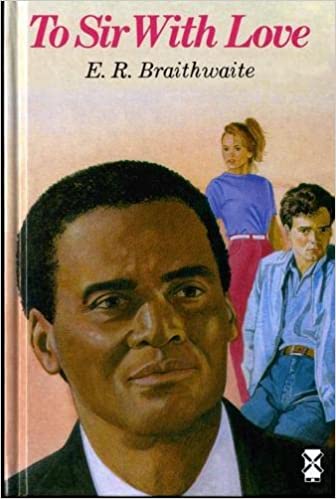To Sir, With Love by E.R. Braithwaite
By treating his students as equals, a schoolteacher creates a unique bond with his class.
As a black man in the 1950s, a time during which racism was rampant, the odds were against E.R. Braithwaite. Few people expected him to succeed as an engineer, much less as a high school teacher in London’s East End. His all-white students were disrespectful at best, and delinquent at worst—an impossible gaggle of undereducated, hormonal teenagers who had no respect for his authority. And yet, despite these bumpy beginnings, Braithwaite was able to turn things around by using a simple but unusual tactic: He would treat his students as adults.
Braithwaite wrote of his experiences in his autobiographical novel, To Sir, With Love, in 1959. Eight years later, it became the classic film of the same name, with Sidney Poitier stepping into Braithwaite’s shoes. Like its source material, the movie is a stirring tribute to the powerful relationships between teachers and students, adults and children. It also serves as an example of how, by recognizing the inherent and equal value of every individual, we can transcend racial and class barriers—whether that’s in the classroom, or outside of it.
In the excerpt of To Sir, With Love below, Braithwaite is still new to Greenslade Secondary School, located in a rough part of the city. After weeks of unsuccessful lessons, he tries a new approach with his students, and finally gets their attention…
I was very keen to disprove the distaff view that the men teachers were inadequate for the job, and I had no wish to give Weston any occasion for gloating, so I kept plugging away, tailoring the lessons to suit the children. I would sometimes walk around the neighborhood after school to learn something of the background in and against which they had been reared, and though this helped me to understand the absence of certain social niceties from their conduct, it made that conduct no more bearable.
One morning I was reading to them some simple poetry, trying, by careful exposition and analysis, to give them something of the beauty it contained both in form and imagery. Just when I thought I had inveigled them into active interest, one of the girls, Monica Page, let the top of her desk fall; the noise seemed to reverberate in every part of my being and I felt a sudden burning anger. I looked at her for some moments before daring to open my mouth; she returned my gaze, then casually remarked to the class at large: “The bleeding thing won’t stay up.” It was all rather deliberate, the noisy interruption and the crude remark, and it heralded the third or “bawdy” stage of their conduct. From then on the words “bloody” or “bleedin’” were hardly ever absent from any remark they made to one another, especially in the classroom. They would call out to each other on any silly pretext and refer to the “bleedin’” this or that, and always in a voice loud enough for my ears. One day during an arithmetic period, Jane Purcell called out to me: “Can’t do this sum, Mr. Braithwaite, it’s too bleedin’ hard,” and sat there looking coolly up at me, her large breasts greasily outlined beneath the thin jumper, her eyes innocently blue in appeal.
“Tell me,” I replied, my voice chill and cutting with repressed anger: “Do you use such words when speaking to your father?”
“You’re not my bleeding father.” Her voice was flat and vicious. I was answered, and I shut up. You nasty little slut, I thought, I played right into your hand.
When the bell sounded for morning recess they rushed out into the corridor and I could hear her being congratulated for “putting the black bastard in his place.” Some of her familiars loudly protested against my question, considering it “bloody cheek” and expressed in clear Anglo-Saxon words what their replies would have been if I had dared to make any comment about their parents. Somehow or other my attempt to correct the girl’s language had been translated into a vicious and unwarranted attack on her parents.
After this incident things became slightly worse than before, and I could not escape the feeling that Weston had every justification for his attitude to the children; their viciousness was so pointless, so very unnecessary. Apart from their language other things were disturbing me. I would often come upon them, boys and girls, in the corridors or on the gloomy stairways, kissing and fondling with adult intentness; at my appearance they would break off and stand about, merely waiting for me to move on so they could resume their interrupted pleasures. After school they would hang about on the stairs or in the washroom, the girls laughingly protesting against the boys’ advances in noisy, bawdy terms; or sometimes I would see a group of them in a corner of the playground in a kind of combined operation.
Although I argued with myself that their conduct, especially outside the classroom, was no business of mine, I could not escape a growing concern about them and about my relationship with them. Besides, the younger children were imitating the behavior of the older ones, and some of the more adventurous small boys would even make “passes” at the older girls. One small boy miraculously escaped serious injury when he crashed through the glass roof of the girls’ lavatory white trying to spy on them.
This incident caused some very heated discussion in the staffroom, but oddly enough it was more concerned with the difficulties which would have resulted if he had seriously injured himself, than with the essential moral questions involved. The girls, too, rapidly recovered from the shock of being suddenly showered with broken glass and could be heard with their cronies in the corridor outside the classroom, laughingly reproving the absent adventurer for his stupidly roundabout way to so unimportant a discovery.
Buy this Book!
Amazon



